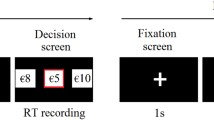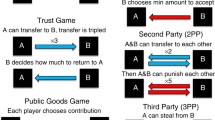Abstract
We use data on response times from a public goods experiment to test the hypothesis that cooperation is instinctive, under the assumption that the longer the time of the decision, the less instinctive the choice. Results seem to support the hypothesis that cooperation is instinctive, while defection is ‘rational’. Moreover, as the experiment is designed also to assess the effects of the consumption of relational goods on cooperation, we are also able to state that some types of relational goods, like team working, produce additional cooperation, but make it less spontaneous. We also detect that females seem to behave less instinctively than males.
Similar content being viewed by others
References
Bowles S., Gintis H. (2011) A cooperative species: Human reciprocity and its evolution. Princeton University Press, Princeton
Brañas P., Cobo_Reyes R., Espinosa M. P., Jiménez-Jiménez N., Kovárik J., Ponti G. (2010) Altruism and social integration. Games and Economic Behavior 69(2): 249–257
Brown T. C., Kingsley D., Peterson G. L., Flores N. E., Clarke A., Birjulin A. (2008) Reliability of individual valuations of public and private goods: Choice consistency, response time, and preference refinement. Journal of Public Economics 92(7): 1595–1606
Camerer C. F. (2003) Behavioral game theory. Princeton University Press, Princeton
Canegallo C., Ortona G., Ottone S., Ponzano F. (2008) Competition versus cooperation: Some experimental evidence. Journal of Socio-Economics 37(1): 18–30
Carpenter J. (2007) Punishing free-riders: How group size affects mutual monitoring and the provision of public goods. Games and Economic Behavior 60(1): 31–51
Chaudhuri A., Graziano S., Maitra P. (2006) Social learning and norms in a public goods experiment with inter-generational advice. Review of Economic Studies 73(2): 357–380
Croson R., Gneezy U. (2009) Gender differences in preferences. Journal of Economic Literature 47(2): 448–474
Davis D., Holt C. (1993) Experimental economics. Princeton University Press, Princeton
Eckel C. C., Grossman P. J. (2001) Chivalry and solidarity in ultimatum games. Economic Inquiry 39(2): 171–188
Fehr E., Gächter S. (2000) Cooperation and punishment in public goods experiments. The American Economic Review 90(4): 980–994
Fehr E., Gächter S. (2004) Fairness and retaliation: The economics of reciprocity. Journal of Economic Perspectives 14(3): 159–181
Ledyard J. (1995) Public goods: a survey of experimental research. In: Kagel J., Roth A. (Eds.), Handbook of experimental economics. Princeton University Press, Princeton, pp 111–194
Lewisch P. G., Ottone S., Ponzano F. (2011) Free-riding on altruistic punishment? An experimental comparison of third-party punishment in a stand-alone and in an in-group environment. Review of Law and Economics 7(1): 1–8
Lotito, G., Migheli, M., & Ortona, G. (2011). An experimental inquiry into the nature of relational goods. POLIS Working Paper 160. Institute of Public Policy and Public Choice POLIS.
Ottone S. (2008) Are people samaritans or avengers?. Economics Bulletin 3(10): 1–8
Ottone S., Ponzano F. (2010) Competition and cooperation in markets. The experimental case of a winner-take-all setting. Journal of Socio-Economics 39(2): 163–170
Piovesan M., Wengström E. (2009) Fast or fair? a study of response times. Economics Letters 105(2): 193–196
Rubinstein A. (2007) Instinctive and cognitive reasoning: A study of response times. The Economic Journal 117(523): 1243–1259
Rubinstein A. (2008) Comments on neuroeconomics. Economics and Philosophy 24: 485–494
Schmidt, M. F. H., & Sommerville, J. A. (2011). Fairness expectations and altruistic sharing in 15-month-old human infants. PloS ONE, 6(10), no indication of pages.
Selten R. (1978) The chain store paradox. Theory and Decision 9(2): 127–159
Sugden R. (1986) The economics of rights, cooperation and welfare. Basil Blackwell, Oxford
Sugden R. (1989) Spontaneous order. Journal of Economic Perspectives 3(4): 85–97
Witt U. (1986) Evolution and stability of cooperation without enforceable contracts. Kyklos 39(2): 245–266
Author information
Authors and Affiliations
Corresponding author
Rights and permissions
About this article
Cite this article
Lotito, G., Migheli, M. & Ortona, G. Is cooperation instinctive? Evidence from the response times in a public goods game. J Bioecon 15, 123–133 (2013). https://doi.org/10.1007/s10818-012-9141-5
Published:
Issue Date:
DOI: https://doi.org/10.1007/s10818-012-9141-5




